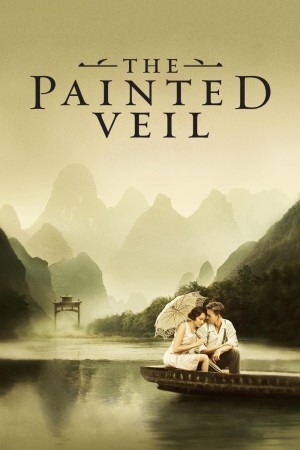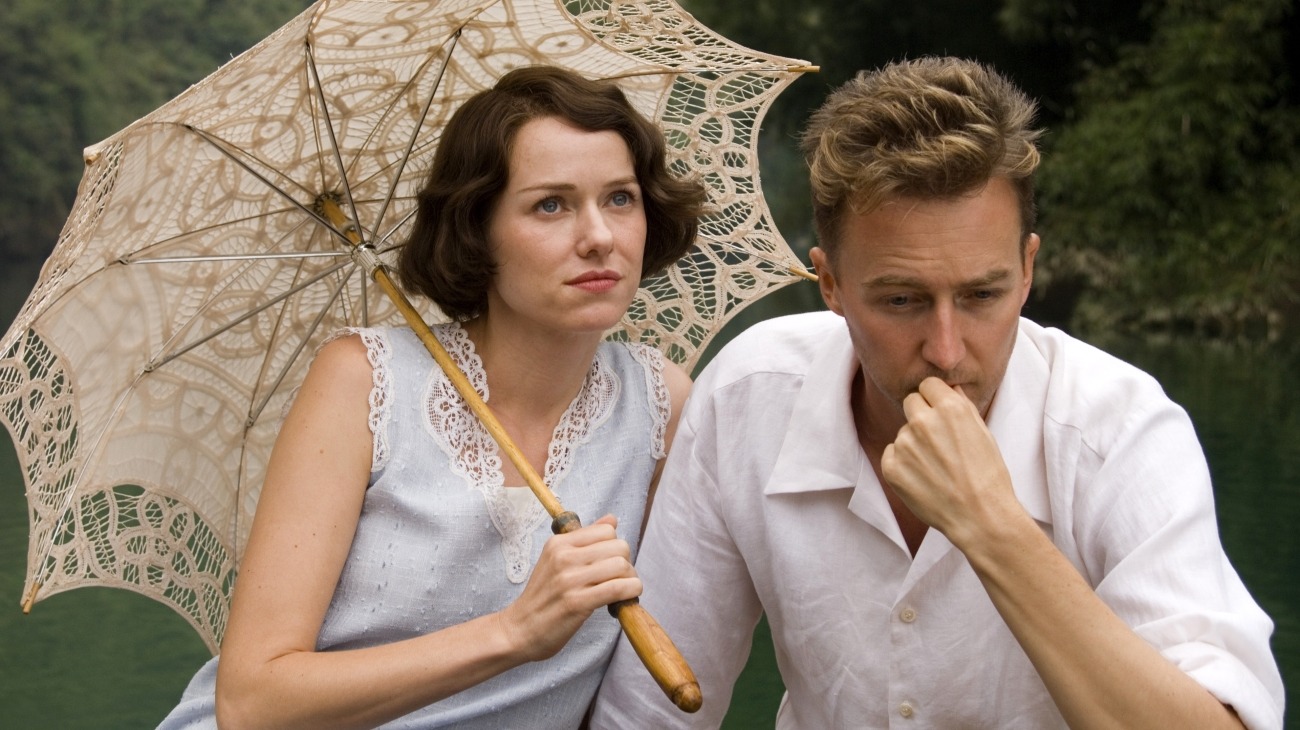
Love in a time of cholera
I try to write about films within 48 hours of viewing them, but with one thing and another, it took me almost a week to get around to The Painted Veil, and this I think is a good thing, because immediately after viewing it, I was under the distinct impression that it was a great deal more interesting than is actually the case.
Why I thought that is obvious to me: Naomi Watts and Edward Norton. Both of them fine actors, and both giving what I am tempted to call the most effective performances of their careers - certainly Norton does, at any rate. In this third adaptation of Somerset Maugham's novel of white people in China in the 1920s, Watts plays Kitty, a bored socialite who marries Norton's Dr. William Fane just before his journey from England to Shanghai. Unfortunately, he is dull and she is a whinger, and to punish her for sleeping with Liev Schreiber, he drags her along to a remote village where he hopes to end a cholera epidemic. No aspect of the script or the advertising tries very hard to hide the fact that in this hellish hellscape, they fall back in love for the first time.
It's boilerplate, but it's boilerplate that the lead actors believe in very strongly: indeed, they are both credited as producers, and there are many whispered stories about the superhuman lengths Norton especially went to in order to make the film. So even though I recognised every beat of the well-worn character arcs, I didn't really mind. There's something special about watching something you've seen done poorly a dozen times done well once, and I've never been an originality junkie in the first place.
What's most impressive, I think, is that neither actor wants to be the hero. Watts plays Kitty with a noticeable proto-feminist flair, taking umbrage at a society that tells her what a woman ought to do (and she clearly enjoys sex! In the '20s!), but at the same time, she's a spoiled child of privilege and Watts doesn't fight that. She's snobbish and unsympathetic even when trying to help the villagers, and it is only in the final act that she reveals any sort of warmth. Norton is much the same way, although the script gives him less room not to be: he talks in clipped, bored tones, never really responding to Watts but only talking at her. Again, he gets to change at the end, but that's not what I tend to think of; I tend to think much more of the great British stick up his ass, and marvel at Norton's delight in leaving it wedged up there.
They're two mesmerising performances, and for a while they were all I could think about. But the days rolled by and it became more obvious that the film around them is kind a big nothing. Not "bad." Not even poorly-made. But kind of pointless.
Director John Curran's last film was the tragically underrated We Don't Live Here Anymore, also a study of bored & distracted people slipping into infidelity, and it was carried off with great skill, shot with a fly-on-the-wall intensity that magnified the domestic squabbling into the stuff of opera. That film had an intimacy that The Painted Veil lacks, I suspect because Curran doesn't quite get a grasp on what to do with China. It's not racist, precisely, not in the post-colonial fashion of Blood Diamond. It's just that the director doesn't want to have to acknowledge the Chinese. There's no real engagement between the characters and the space they occupy, and one begins to feel that the director would be happier shooting the movie on a blank soundstage (indeed, the best moments of this film are almost all in dark room against black backgrounds). We Don't Live Here Anymore is a tiny film, and when The Painted Veil works, it works on a tiny level. But it's not a tiny story - cholera! Chinese Nationalists! - and the less-intimate scenes are treated with indifference.
There are lots of vistas, all pretty as a postcard, of course - China has one of "those" landscapes - but that's not a substitute for scope. And the unfortunate side-effect of this inability to grapple with its scope turns a David Lean-scaled story of individuals caught by history into a genteel Merchant Ivory-scaled chamber drama. Not that I have any problem with Merchant & Ivory's films* as such, but their model of "white people surround by exotic loveliness without paying attention to any of it" is not a good model to follow.
Still, as a Merchant Ivory film, it's much better than Merchant Ivory's late output, and the intimate part of the story is genuinely affecting and extraordinarily well-acted. Or put it this way: it's better than at least 40% of the current Oscar front-runners.
7/10
Why I thought that is obvious to me: Naomi Watts and Edward Norton. Both of them fine actors, and both giving what I am tempted to call the most effective performances of their careers - certainly Norton does, at any rate. In this third adaptation of Somerset Maugham's novel of white people in China in the 1920s, Watts plays Kitty, a bored socialite who marries Norton's Dr. William Fane just before his journey from England to Shanghai. Unfortunately, he is dull and she is a whinger, and to punish her for sleeping with Liev Schreiber, he drags her along to a remote village where he hopes to end a cholera epidemic. No aspect of the script or the advertising tries very hard to hide the fact that in this hellish hellscape, they fall back in love for the first time.
It's boilerplate, but it's boilerplate that the lead actors believe in very strongly: indeed, they are both credited as producers, and there are many whispered stories about the superhuman lengths Norton especially went to in order to make the film. So even though I recognised every beat of the well-worn character arcs, I didn't really mind. There's something special about watching something you've seen done poorly a dozen times done well once, and I've never been an originality junkie in the first place.
What's most impressive, I think, is that neither actor wants to be the hero. Watts plays Kitty with a noticeable proto-feminist flair, taking umbrage at a society that tells her what a woman ought to do (and she clearly enjoys sex! In the '20s!), but at the same time, she's a spoiled child of privilege and Watts doesn't fight that. She's snobbish and unsympathetic even when trying to help the villagers, and it is only in the final act that she reveals any sort of warmth. Norton is much the same way, although the script gives him less room not to be: he talks in clipped, bored tones, never really responding to Watts but only talking at her. Again, he gets to change at the end, but that's not what I tend to think of; I tend to think much more of the great British stick up his ass, and marvel at Norton's delight in leaving it wedged up there.
They're two mesmerising performances, and for a while they were all I could think about. But the days rolled by and it became more obvious that the film around them is kind a big nothing. Not "bad." Not even poorly-made. But kind of pointless.
Director John Curran's last film was the tragically underrated We Don't Live Here Anymore, also a study of bored & distracted people slipping into infidelity, and it was carried off with great skill, shot with a fly-on-the-wall intensity that magnified the domestic squabbling into the stuff of opera. That film had an intimacy that The Painted Veil lacks, I suspect because Curran doesn't quite get a grasp on what to do with China. It's not racist, precisely, not in the post-colonial fashion of Blood Diamond. It's just that the director doesn't want to have to acknowledge the Chinese. There's no real engagement between the characters and the space they occupy, and one begins to feel that the director would be happier shooting the movie on a blank soundstage (indeed, the best moments of this film are almost all in dark room against black backgrounds). We Don't Live Here Anymore is a tiny film, and when The Painted Veil works, it works on a tiny level. But it's not a tiny story - cholera! Chinese Nationalists! - and the less-intimate scenes are treated with indifference.
There are lots of vistas, all pretty as a postcard, of course - China has one of "those" landscapes - but that's not a substitute for scope. And the unfortunate side-effect of this inability to grapple with its scope turns a David Lean-scaled story of individuals caught by history into a genteel Merchant Ivory-scaled chamber drama. Not that I have any problem with Merchant & Ivory's films* as such, but their model of "white people surround by exotic loveliness without paying attention to any of it" is not a good model to follow.
Still, as a Merchant Ivory film, it's much better than Merchant Ivory's late output, and the intimate part of the story is genuinely affecting and extraordinarily well-acted. Or put it this way: it's better than at least 40% of the current Oscar front-runners.
7/10
Categories: costume dramas, love stories, oscarbait






